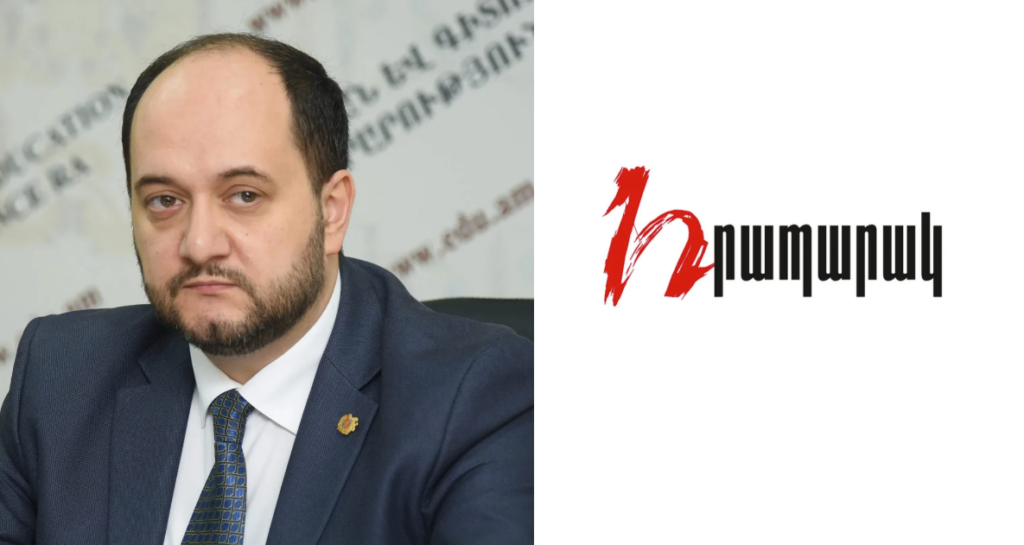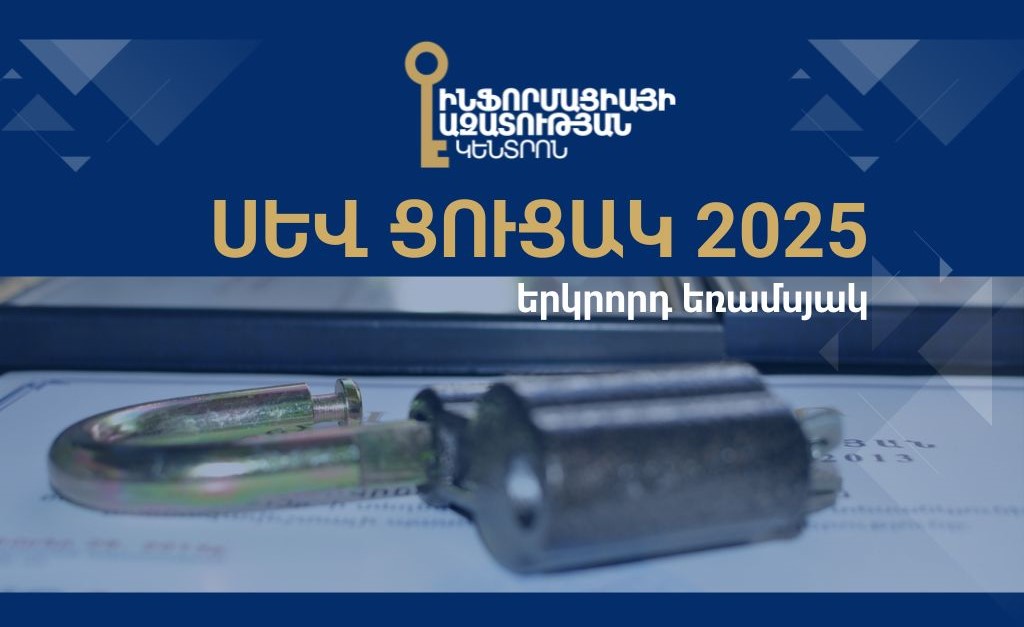Facts
On August 19, 2022, Arayik Harutyunyan, the Chief of Staff at the Office of the RA Prime Minister, filed a lawsuit against Hraparak Daily Ltd. with the Court of General Jurisdiction of Yerevan, demanding to refute the information considered defamatory and pay 2 million drams in compensation (court case No. ED/43227/02/22). The lawsuit was caused by an article titled “Hrach Indoors, Avinyan Outdoors: Clashes Averted,” published on July 21, 2022 on Hraparak.am website owned by Hraparak Daily Ltd.
Arayik Harutyunyan stated that the following sentence in the article was defamatory: “Arayik Harutyunyan, the Chief of Staff to the RA Prime Minister, and his brother Aram Harutyunyan—who owns a private company and takes over the management of big-budget projects—also play an active role in matters related to managing the city.” According to the plaintiff, the excerpt presented details suggesting the commission of illegal acts, which were untrue and tarnished his honor and dignity. Added to that, Arayik Harutyunyan maintained that the information in question met the other criteria to be qualified as defamation: it was neither abstract nor hypothetical, but a concrete remark made publicly.
On December 24, 2024, the court ruled to partially uphold the lawsuit, obliging the media to publish a refutation and pay 226 thousand drams to the plaintiff. Of this amount, 200 thousand were intended as compensation for the damage caused by defamation, and 26 thousand were for the state duty.
In its judicial act, the court highlighted that prior to evaluating the remark addressed to the plaintiff, it was necessary to first determine whether the media could be held liable for defamation if the author of the article was Lusineh Shahverdyan. The court found that, despite Lusineh Shahverdyan’s name appearing at the top of the publication on the defendant company’s website, she was still regarded as an unidentified source under the RA Law “On Mass Communication.” This was because, beyond her name and surname, no further identifying information was provided—specifically, no residential or registration address, or, if she carried out media activities as an individual entrepreneur, a state registration number.
Regarding the defendant’s claim of not being the author of the article in question, the court pointed out that the media had failed to provide any evidence that the individual who had published it on the website had an agreement with the company, based on which Hraparak daily would have been considered merely a distributor rather than an author. Consequently, the court determined that Lusineh Shahverdyan could not be classified as an implementer of media activities, and the responsibility should lay with the media.
By analyzing the sentence addressed to the plaintiff in its distinct parts, the court concluded that the expression “Arayik Harutyunyan, the Chief of Staff to the RA Prime Minister, also plays an active role in matters related to managing the city…” was untrue, since the city’s territorial governance lies with the RA Ministry of Territorial Administration and Infrastructure, while the infrastructure considered Yerevan’s property is managed by the Mayor of Yerevan. The Chief of Staff to the Prime Minister holds no such authority, and the expression tarnished his honor and dignity by attributing an unlawful act to him. The court further noted that the published information was unreliable, directly targeted the plaintiff, and was defamatory in nature.
The court found that an illegal act was also attributed to the brother of the Prime Minister’s Chief of Staff. Despite the brother’s name being incorrectly written as Aram Harutyunyan in the publication, it was evident from the content that the article referred to Arayik Harutyunyan’s brother, Arman Harutyunyan. According to the court, the act of tarnishing the latter’s honor and dignity also affected the plaintiff’s good reputation as a high-ranking official, creating a wrong impression of his family.
When addressing the issue of choosing a measure of liability, the court observed that the defendant company was actively engaged in media activities, yet failed to provide information about its financial status during the examination of the case, which created certain difficulties in determining the amount of pecuniary compensation. The court emphasized that any compensation amount should be chosen in a way that does not disrupt the regular operations of the media. Given that the confiscation of the sum sought in the lawsuit could hinder the defendant’s work and disproportionately restrict their freedom of speech, the court, at its discretion, set the amount of compensation at 200 thousand drams, finding it to be a reasonable sum.
Following the release of the judicial act, Arayik Harutyunyan made a post on his Facebook page, commending the verdict. He noted that this was one of the rare cases he had turned to court, and that he had done so because the media “go beyond all reasonable limits” by publishing such pieces. He also mentioned his prior appeals to Media Ethics Observatory regarding publications on oragir.am and 24news.am websites, urging officials to turn to that body rather than pursue legal action.
CONCLUSION
During the court proceedings, the defendant media argued that it could not be held liable for Lusineh Shahverdyan’s article, as it was not the author but merely a platform that distributed the publication, while Lusineh Shahverdyan was its source, and the media was therefore protected by paragraphs 6 and 9 of Article 1087.1 of the Civil Code. In response, the court concluded that Hraparak daily, as an implementer of media activities, could be held liable for the article written by Lusineh Shahverdyan, since her personal data as an author were missing from the media platform, and the media had failed to provide evidence that Lusineh Shahverdyan was an independent author who had published the piece on its website, while the media acted merely as a distribution platform.
With regard to this conclusion of the court, the IDC believes that paragraph 6 of Article 1087.1 of the Civil Code sets out an exhaustive list of sources, whose information, when reproduced in good faith, exempts an individual from liability. This list does not include journalists. This provision pertains to the exemption from liability for reproducing information obtained from five specific sources: a news agency, a public speech by a private individual, an official document, another media, and any other authored work. Once again, this list is exhaustive. The legislator did not intend to classify journalists who produce their own articles as sources of information. Hence, the IDC does not consider paragraph 6 of Article 1087.1 of the Civil Code to be applicable to the dispute in question. Hraparak daily did not reproduce information published by another source, Lusineh Shahverdyan, but rather published an article authored by journalist Lusineh Shahverdyan. In this case, both the implementer of media activities and the journalist assume joint rights and responsibilities, unless a civil law contract between them specifies otherwise. The court further observed that the media had not provided any evidence of such a special contractual agreement.
As for paragraph 9 of Article 1087.1, which was also referred to by Hraparak daily in its defense, the statement “or the implementer of media activities, exercising their right not to disclose the source of information, refrains from revealing the name of the author” mentioned there also applies to the journalists’ source, not the journalists themselves. Therefore, this provision is not applicable to the dispute being considered either. In this case, Lusineh Shahverdyan was not a source for the implementer of media activities, but a journalist, an author for the implementer of media activities (media), with both being jointly considered publishers. And since the media failed to present information about the journalist’s identity during the trial, which could have allowed the plaintiff to include the journalist in the lawsuit, the plaintiff filed the lawsuit against the media as the publisher of the piece in question, in accordance with the procedure prescribed by law. Thus, in this context, the IDC generally agrees with the court’s view, especially considering that it was the media that made the decision to publish the information, becoming the initial platform for its dissemination.
In contrast to the aforementioned point, the IDC disagrees with the court’s conclusion that the phrase “Arayik Harutyunyan, the Chief of Staff to the RA Prime Minister, also plays an active role in matters related to managing the city…” tarnishes the plaintiff’s reputation. The IDC is inclined to consider that this phrase falls within the permissible bounds of criticism of high-ranking officials, a practice necessary for democracy. At the same time, it is apparent that the author did not make sufficient efforts to present the expression in such a way that would make it clear whether the claim about Arayik Harutyunyan’s involvement in city governance was factual information or a value judgment. Nevertheless, the IDC, guided by the importance of critical speech in a democratic society, believes that the aforementioned statement does not damage an individual’s reputation to a degree that goes beyond a high-ranking official’s public duty to tolerate criticism directed at their public activities.
The court’s conclusion regarding Arayik Harutyunyan’s brother, in particular, the idea that the act attributed to his brother could discredit the plaintiff, is also worth discussing. This argument is clearly unfounded and cannot be considered legally valid. Such an interpretation violates the principle of distinguishing the act and the individual: in insult and defamation cases, no one else can bear the consequences for the damage caused to an individual, regardless of family or friendship ties with the affected individual.
Based on the above, the IDC concludes that the court’s decision in this case disproportionately restricts the media’s right to disseminate information and ideas.
Information Disputes Council
Shushan Doydoyan (IDC Secretary), President of Freedom of Information Center
Ara Ghazaryan, Director of “Ara Ghazaryan” Law Firm
Boris Navasardian, Honorary President of Yerevan Press Club
Aram Abrahamyan, Chief Editor of “Aravot” Daily
Ashot Melikyan, Chairman of Committee to Protect Freedom of Expression
Olga Safaryan, Lawyer








